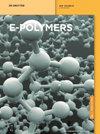Impact of ionic liquids on the thermal properties of polymer composites
IF 3.3
3区 化学
Q2 POLYMER SCIENCE
引用次数: 0
Abstract
The integration of ionic liquids and polymer composites has become a promising way to improve their thermal properties, representing a notable advancement in the development of advanced materials for specific applications. Their thermal properties heavily influence the suitability of polymer composites for particular applications. It is imperative to understand and manipulate the thermal behavior of these composites to optimize their performance across various fields. In this mini-review, diverse polymer matrices and fillers utilized in polymer composites containing ionic liquids are categorized. Additionally, various ionic liquids employed in studies related to the thermal properties of polymer composites are identified. The impact of ionic liquids on the thermal properties of these composites is also briefly reviewed. The knowledge illustrated in this review enriches the understanding of the types of polymer matrices and fillers used in conjunction with ionic liquids, as well as their thermal properties. In a nutshell, imidazolium-based ionic liquids with tetrafluoroborate, bis(trifluoromethylsulfonyl)imide, hexafluorophosphate, halides, and hydrogen sulfate anions have the impact of improving the glass transition temperature, melting temperature, degradation temperature, and thermal conductivity of thermoplastic, thermosetting, and elastomer composites.离子液体对聚合物复合材料热性能的影响
离子液体与聚合物复合材料的结合已成为改善其热学特性的一种很有前途的方法,代表了为特定应用开发先进材料方面的显著进步。离子液体的热性能在很大程度上影响着聚合物复合材料在特定应用中的适用性。当务之急是了解并控制这些复合材料的热行为,以优化其在各个领域的性能。在这篇微型综述中,对含有离子液体的聚合物复合材料中使用的各种聚合物基材和填料进行了分类。此外,还介绍了在聚合物复合材料热性能相关研究中使用的各种离子液体。还简要回顾了离子液体对这些复合材料热性能的影响。本综述介绍的知识丰富了人们对与离子液体结合使用的聚合物基材和填料类型及其热性能的了解。简而言之,含有四氟硼酸盐、双(三氟甲基磺酰基)亚胺、六氟磷酸盐、卤化物和硫酸氢阴离子的咪唑基离子液体可改善热塑性、热固性和弹性体复合材料的玻璃化转变温度、熔化温度、降解温度和导热性能。
本文章由计算机程序翻译,如有差异,请以英文原文为准。
求助全文
约1分钟内获得全文
求助全文
来源期刊

e-Polymers
化学-高分子科学
CiteScore
5.90
自引率
10.80%
发文量
64
审稿时长
6.4 months
期刊介绍:
e-Polymers is a strictly peer-reviewed scientific journal. The aim of e-Polymers is to publish pure and applied polymer-science-related original research articles, reviews, and feature articles. It includes synthetic methodologies, characterization, and processing techniques for polymer materials. Reports on interdisciplinary polymer science and on applications of polymers in all areas are welcome.
The present Editors-in-Chief would like to thank the authors, the reviewers, the editorial staff, the advisory board, and the supporting organization that made e-Polymers a successful and sustainable scientific journal of the polymer community. The Editors of e-Polymers feel very much engaged to provide best publishing services at the highest possible level.
 求助内容:
求助内容: 应助结果提醒方式:
应助结果提醒方式:


